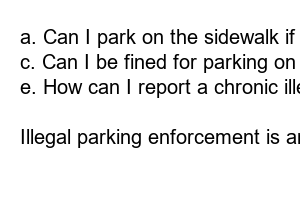불법주정차 단속 기준
Title: Demystifying Illegal Parking Enforcement Standards: Everything You Need to Know
Introduction:
Illegal parking can be a nuisance for both motorists and pedestrians, causing unnecessary traffic congestion and potentially compromising road safety. To address this issue effectively, it is important to understand the enforcement standards in place. In this blog post, we delve into the world of illegal parking enforcement, shedding light on the processes, penalties, and frequently asked questions to help you stay informed.
Subheadings:
1. What is Illegal Parking Enforcement?
Illegal parking enforcement refers to the measures taken by authorities to regulate and control unauthorized parking of vehicles in designated areas.
2. Understanding Parking Offenses and Penalties:
From blocking pedestrian walkways to parking in no-parking zones or disabled spots, parking offenses vary in severity. Penalties may range from fines to vehicle impoundment or even the suspension of driving privileges.
3. The Role of Traffic Wardens:
Traffic wardens play a crucial role in enforcing parking regulations. With their authority to issue tickets and report violations, they ensure compliance with parking rules and contribute to a smoother traffic flow.
4. Ticketing and Adjudication Processes:
When a parking violation occurs, a ticket is usually issued to the violator. This ticket includes information such as the offense, location, and fine amount. Should the offender wish to contest the ticket, an adjudication process is in place to provide a fair resolution.
5. Technology Advancements in Illegal Parking Enforcement:
Technological advancements have revolutionized illegal parking enforcement. From automated ticketing systems to license plate recognition cameras, authorities are leveraging these innovations to streamline enforcement processes and improve accuracy.
6. Community Involvement in Parking Enforcement:
Community involvement plays a vital role in illegal parking enforcement. Residents can report violations, making enforcement more efficient. Neighborhood watch programs and awareness campaigns also contribute to the creation of a more responsible parking culture.
7. Frequently Asked Questions (FAQs):
a. Can I park on the sidewalk if no pedestrians are around?
b. What should I do if I receive a parking ticket in error?
c. Can I be fined for parking on private property without permission?
d. Can I challenge a parking ticket if the sign was unclear?
e. How can I report a chronic illegal parking issue in my neighborhood?
f. Is it legal to park in a disabled spot with a disabled person’s placard when they are not present?
Summary:
Illegal parking enforcement is an integral part of maintaining order on our roads. By abiding by parking regulations and understanding the processes and penalties involved, we can ensure a safer, more efficient transportation system for all. Remember, reporting violations and being mindful of others’ needs are essential in creating a responsible parking culture within our communities.

